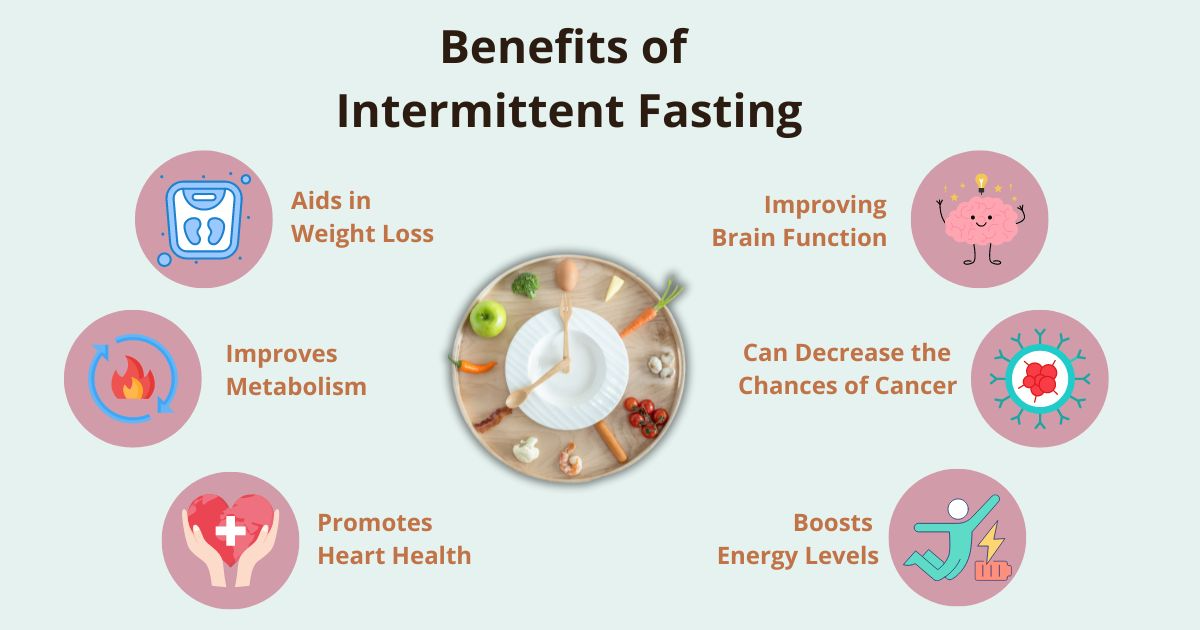Intermittent fasting has become one of the most popular health and fitness trends worldwide. But what is intermittent fasting, and why has it gained so much attention? Intermittent fasting is an eating pattern that cycles between periods of fasting and eating. Unlike traditional diets, it doesn’t dictate rigidly what you eat but rather when you eat, making it a flexible and sustainable approach for many. This article looks at the benefits of intermittent fasting and how such a simple dietary approach can help improve your health.
1. Aids in Weight Loss
One of the major reasons why people adopt intermittent fasting is to lose weight. Intermittent fasting and weight loss often go hand in hand. By restricting eating time and strictly speaking the number of times that one eats rather than the period of time one eats with a prolonged period of fasting, body starts using fat stores for energy, helping you shed those extra pounds more effectively than many other diets.
2. Improves Metabolism
Intermittent fasting benefits include a boost in metabolism. Fasting will lower the level of insulin in your body and switch to burning fats for energy ( Called Carb to fat switch). This actually supports the weight loss process by inducing Metabolic flexibility and change in bio-composition and improves your overall metabolic rate, making it easier to maintain a healthy weight long-term.
3. Promotes Heart Health
Intermittent fasting boosts your heart health. Research shows that intermittent fasting can reduce risk factors like cholesterol levels, blood pressure, and inflammation, all of which are linked to heart disease. This makes it a great addition to any intermittent fasting diet.
4. Improving Brain Function
The health benefits of intermittent fasting aren’t just physical; they’re mental too. Studies suggest that intermittent fasting may help improve brain function by reducing oxidative stress and inflammation, which have an impact on better memory and cognitive function.
5. Supports Cellular Repair
Fasting triggers autophagy, a process where your body cleans out damaged cells and regenerates new ones.. This is one of the key benefits of fasting, as it helps in preventing diseases and slowing down the aging process ( postpones Senescence) .
6. Can Decrease the Chances of Cancer
Some studies have shown that intermittent fasting may reduce the risk of cancer. This is partly due to its ability to lower insulin levels and help repair damaged cells, which can prevent cancerous growths from forming.
7. Balances Hormones
Intermittent fasting for weight loss works partly by balancing your hormones. Fasting helps regulate insulin, growth hormone, and norepinephrine levels, which play a crucial role in your body’s ability to burn fat and build muscle.
8. Improves Digestion
Another benefit of intermittent fasting is improved digestion. By giving your digestive system a break during fasting periods, you allow your body to focus on repairing and detoxifying, leading to better gut health.
9. Boosts Energy Levels
Many people report increased energy levels as one of the intermittent fasting health benefits. With stabilized blood sugar levels and improved metabolism, your body becomes more efficient at using energy, leading to more sustained energy throughout the day.
10. Simplifies Your Life
Lastly, intermittent fasting simplifies your life by reducing the number of meals you need to plan and prepare. This not only saves time but can also help you develop a healthier relationship with food, focusing on quality over quantity.
The Role of Ruby Roti in Intermittent Fasting
Incorporating Ruby Roti into your intermittent fasting diet can amplify the health benefits you experience. Ruby Roti, made from nutrient-rich ingredients, is not just a healthy alternative to regular bread but also an excellent source of fiber, vitamins, and minerals. When you break your fast with Ruby Roti, you’re giving your body essential nutrients that support digestion and keep you feeling full longer, which helps in maintaining steady energy levels throughout the day. The high fiber content also aids in stabilizing blood sugar levels, making it an ideal choice for those practicing intermittent fasting.
Adding Ruby Roti to your meals during your eating window can enhance the overall benefits of fasting by promoting better digestion, improving gut health, and providing sustained energy. The slow-release of glucose prevents spikes in blood sugar, which is crucial for maintaining a balanced metabolism and preventing overeating with the dips that is usually seen in sugar rich foods. . Whether you’re looking to lose weight or improve your health, Ruby Roti is a wholesome, satisfying option that complements the principles of intermittent fasting perfectly.
Conclusion
Intermittent fasting is more than just a trend—it’s a powerful tool for improving your health. Whether you’re interested in intermittent fasting for weight loss or looking to boost your overall well-being, the benefits are clear. If you’re curious about how to do intermittent fasting, start by choosing a fasting schedule that fits your lifestyle, and enjoy the numerous health benefits that come with it.
FAQs
-
Is it OK to intermittent fast every day?
Yes, but it depends on the method and individual health conditions. Daily fasting (like 16:8) is generally safe, but prolonged fasting should be done with caution. -
What happens after 1 month of intermittent fasting?
You may experience weight loss, better digestion, improved energy levels, and enhanced mental clarity, but results vary based on diet and lifestyle. -
What are the important rules of intermittent fasting?
Stay hydrated, eat nutrient-dense foods during eating windows, avoid processed foods, and listen to your body to prevent over-restriction. -
What are the risks of intermittent fasting?
Possible risks include low energy, nutrient deficiencies, headaches, irritability, and disordered eating if not done properly or with extreme restrictions. -
Why do I feel sleepy during intermittent fasting?
Sleepiness can occur due to low blood sugar, dehydration, or the body adjusting to a new eating pattern; staying hydrated and eating balanced meals can help.


